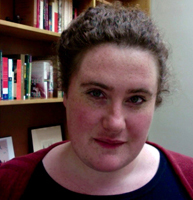
The Department of History is glad to formally welcome Dr. Lucy Kaufman, who joined our faculty this fall, to the ten Hoor family.
From childhood through high school, Dr. Kaufman’s father would tell her and her sister “three-minute history lessons” on the way to school in the morning, and it was because of this that she “fell in love with the great stories in history,” she says. Dr. Kaufman was a Renaissance Studies major as an undergraduate at Yale, but she wasn’t sure what she wanted to do. She was briefly a theater administrator, as she was also involved in theater in college, but she says it was “a very practical job. I missed the part where I sat around and talked about ideas.” She then got her Masters of Philosophy in Early Modern History at Cambridge and returned to Yale to get her PhD.

During her time teaching at Keble College at the University of Oxford, Kaufman worked at The Vyne, a historical home owned by the National Trust that was built by Sir William Sandys, King Henry VIII’s Lord Chamberlain. She was involved in a recent renovation of the grounds. “The most amazing part for me was the chapel, which was transformed into what the chapel would have looked like when Henry VIII visited in 1535.” It was remade to look like a Catholic chapel, complete with incense and a 16th century liturgical soundscape. Speakers throughout create the effect that you are walking through a Mass as it is being performed. “It makes it seem as though you’re stepping back in time.” Dr. Kaufman was an historical consultant for the project, trained volunteers, and facilitated communication between the National Trust and British Universities, and served as a spokesperson for the press. Dr. Kaufman efforts with this project were recognized with the receipt of the 2017 Vice-Chancellor’s Public Engagement and Research Award.
Her research focuses on the social, political, and religious history of Early Modern England. “I’m interested most broadly in how societies are remade after moments of great change,” she says. “I think often we focus on destruction rather than creation as historians…What I’m interested in is how society is remade.” She is finishing a project on the Reformation’s impact in the everyday lives of church parishes in Elizabethan England, and she has begun a new project on ideological immigration in England in the 1570s and 1580s, when Protestant refugees fled Catholic countries in continental Europe and came to England for religious and ideological freedom.
“I’m really excited to work with this faculty,” Dr. Kaufman says, “and I’m really excited to teach such an intellectually and personally diverse student body.” She is also looking forward to the opportunity to teach Americans about British History, after having taught in England, because “you have to sort of teach it from the ground up.” Since she has to consider what is most important about these people and events, she says that it forces her to think more deeply about her subject. She is also looking forward to being a part of a department and university that are growing and expanding.
We are very happy to have Dr. Kaufman with us, and we are equally excited to continue to work and grow as a department with her. Welcome, Dr. Kaufman!